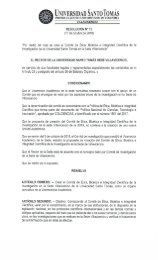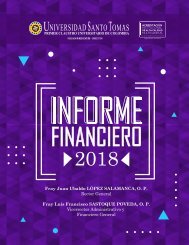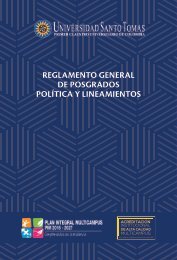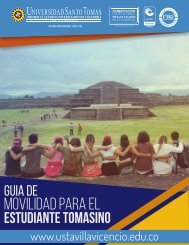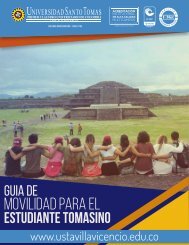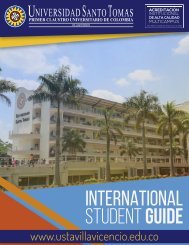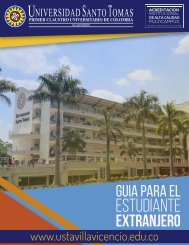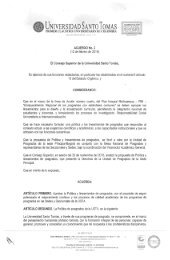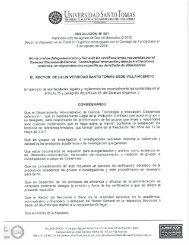05-Boletín USTA - Speaks (Quinta Edición)
Create successful ePaper yourself
Turn your PDF publications into a flip-book with our unique Google optimized e-Paper software.
Issue 5<br />
Nov-Dec<br />
2016<br />
s peaks<br />
U TA<br />
FOREIGN LANGUAGE INSTITUTE<br />
New York Culture<br />
What is the Finding<br />
Dory movie effect?<br />
Walk with teacher<br />
Find out how a blockbuster<br />
film affects<br />
Nelson through his<br />
memories and the<br />
real life.<br />
streets of the Big<br />
Apple. Go to page 6<br />
Find it out on page 4<br />
Equal Rights<br />
Read more, page 8<br />
A wonderful event<br />
ustaspeaksvillavo@usantotomas.edu.co
EDITORIAL<br />
2<br />
Writing: a way to scatter thoughts<br />
By: Lucimaver González Robayo, FLI Coordinator<br />
Dear faithful readers,<br />
<strong>USTA</strong> SPEAKS welcome you to our fifth edition –<br />
an edition inspired by teaching experiences. The main<br />
purpose of this publication is to share the vast knowledge<br />
of the <strong>USTA</strong> community, and encourage others<br />
to become interested in writing.<br />
Being immersed in a teaching community implies<br />
that one is aware of their own teaching and learning<br />
environments, which can encourage both students and<br />
educators to reflect on teaching dynamics in a variety<br />
of settings. Therefore, students and teachers can examine<br />
their beliefs about teachers’ views on effective<br />
motivational strategies, and build positive and academic<br />
contexts.<br />
One way to think about meaningful teaching practices<br />
is to contrast it with day-to-day surroundings. In<br />
this sense, this bulletin allows readers to feel identified<br />
with teaching patterns that emerge spontaneously while<br />
interacting inside an academic environment.<br />
We open this edition with: (Brief description of the<br />
sections included in this edition)<br />
The FLI thanks all teachers, students, and writers<br />
who helped make this bulletin possible. All your inspirational<br />
papers are meaningful and relevant insights to<br />
our teaching context. We encourage the community to<br />
contribute to future editions, and make all teaching and<br />
classroom experiences more visible in our daily lives.<br />
On behalf of <strong>USTA</strong> SPEAKS, I want to thank to the<br />
Editorial Committee for their effort and hard work.<br />
―There’s always room for a story that can transport<br />
people to another place.‖— J.K. Rowling<br />
Fr. José Arturo Restrepo Restrepo O.P.<br />
President<br />
Fr. Fernando Cajicá Gamboa O.P.<br />
Academic Vice-president<br />
EDITORIAL COMMITTEE<br />
Coordinator<br />
Lucimaver González Robayo<br />
Editor<br />
Yomaira Angélica Herreño Contreras<br />
Proofreaders<br />
Mckenna Marie Wellhousen<br />
Designer and Diagrammer<br />
Iván Felipe Marín Escobar<br />
Frontend Developer<br />
Rubén Mauricio Muñoz Morales<br />
www.idiomasustavillavo.com
3<br />
s peaks<br />
STUDENTS’ INSIGHTS U TA<br />
Descansa<br />
By: Juan Carlos Álvarez Rojas, Law Student, 4 th semester<br />
Mariposa agonizante y angustiada no vueles más,<br />
Descansa tus alas, estás hastiada de vivir,<br />
El mismo viento de todos los días ya no huele a gloria y libertad<br />
como antes,<br />
Como antes que sin importar nada te sumergías entre los<br />
bosques y restaurantes,<br />
Como antes que volabas entre nubes y pensamientos,<br />
Como antes que adornabas pinturas y momentos,<br />
Pero todo es pasajero y no te culpo por posarte en uno de<br />
mis muros aguardando la parca,<br />
Mi cuarto al igual que tu vibra es oscura y repulsiva,<br />
Y te ocultas en el blanco manicomio de mi encierro,<br />
Dando giros estrepitosos intentas abandonar aquel sentimiento de finalidad,<br />
Pero como todo ser viviente sucumbes ante el imperio de los<br />
muertos, No caes, permaneces inerte, estable, firme, pero ausente…<br />
Te admiro, así deseo morir, como tú y los árboles, ajeno y de pie.<br />
Beatriz Level, Brazilian exchange student<br />
DESEO<br />
Deseo que el sol ilumine tu alma,<br />
quiero que la vida te sonría<br />
cuando te encuentres triste.<br />
Dudo que puedas tener tanta tranquilidad<br />
como cuando estás conmigo.<br />
Necesito que no olvides<br />
los buenos momentos vividos,<br />
y que puedas esperar un poco más<br />
hasta que vuelva,<br />
y una vez más pueda mirar en tus ojos,<br />
y ver a través de tu alma<br />
que estás tranquilo<br />
una vez más por estar a mi lado.<br />
“If there is a book that you want to read, but it hasn’t been written yet, you must<br />
be the one to write it.” Toni Morrison
TEACHERS’ VIEW<br />
TEACHERS’ VIEW<br />
4<br />
By: Nelson Segura, English Teacher,<br />
Foreign Language Institute, Santo Tomás University<br />
NEW YORK CULTURE<br />
Empire State Building<br />
I grew up in<br />
Brooklyn one<br />
of the 5 boroughs<br />
of<br />
New York<br />
City. NYC is<br />
also called<br />
the Big Apple,<br />
there are<br />
many rumors<br />
why it was<br />
named the Big<br />
Apple. NYC is also known as the Melting Pot because<br />
it’s a place where people from many cultures<br />
form a new diverse society. In NYC you can be in<br />
the middle of Chinatown and just a few short<br />
Brooklyn Bridge<br />
blocks away be in Little Italy. The same with people.<br />
I grew up with Italians, Puerto Ricans and Russian<br />
Gypsies. So you can also find all different<br />
types of food at a short distance. I loved growing<br />
up in NY because of the 4 seasons, in the Fall we<br />
played football and went to Central park to look at<br />
how the leaves on the trees changed colors, in the<br />
Winter we went ice skating in Rockefeller Center<br />
and made snowmen in front of the house, in the<br />
Spring we would go to the zoo and the park. And<br />
in the Summer we would go to the pool, the beach<br />
or simply open a fire hydrant on our block. There<br />
was always something to do whether it was playing<br />
stickball in the street or taking the subway into the<br />
city to watch a movie, catch a Broadway show or<br />
just watch the street performers. I wouldn’t trade<br />
my childhood<br />
in<br />
Brooklyn<br />
and am<br />
very grateful<br />
for it<br />
today. NY<br />
has also<br />
produced<br />
Statue of Liberty<br />
some of my favorite people. With the exception of<br />
Donald Trump. New Yorkers were the people who<br />
made my childhood special, including of course<br />
my family and friends. And I can’t forget my favorite<br />
baseball team the NY Yankees, the best team<br />
in baseball history. In conclusion if so many cultures<br />
can get along in NYC. Why can this happen<br />
all over the world. NYC is probably the only city<br />
Time Square
5<br />
s peaks<br />
TEACHERS’ VIEW U TA<br />
CAN VIRTUAL EDUCATION BE EFFECTIVE?<br />
By: Jaime Andrés Prieto Torres, Basic Sciences - Master in Electronic and Systems Engineering<br />
Classroom education has been the most used<br />
approach by people. However, these teaching programs<br />
set strict conditions about places and times<br />
for developing them. This inflexibility had promoted<br />
virtual education. These kind of teaching programs<br />
use ICT for setting interaction between<br />
teachers and students. It is highly flexible regarding<br />
locations and schedules. However, could this<br />
approach satisfy learning people needs?<br />
On one hand, ICT in virtual education keeps<br />
content available all the time, and students are free<br />
to look for resources as long as they wish. Additionally,<br />
ICT bridges communication between<br />
teachers and students by setting spaces for solving<br />
doubts, sharing information, and promoting collaborative<br />
work. This educational environment permits<br />
the students to save money and time in terms<br />
of transportation from campus to campus.<br />
On the other hand, virtual education does not<br />
offer face to face interaction, making it difficult to<br />
build strong relationships between teachers and<br />
classmates. It is an environment in which it is not<br />
easy to make friends.<br />
In conclusion, even without personal contact<br />
with teachers and classmates, virtual education is<br />
an efficient educational approach that fosters autonomous<br />
learning. Nevertheless, effectiveness of<br />
virtual education depends on the students. Only<br />
with responsible and determined students it is possible<br />
to ensure high level of effectiveness. Virtual<br />
education is an amazing system which offers great<br />
resources and tools that allows its students to reach<br />
“If a nation loses its storytellers, it loses its childhood.” Peter Handke
TEACHERS’ VIEW<br />
6<br />
WHAT IS THE FINDING DORY MOVIE EFFECT?<br />
By: Fabian Moreno Rodriguez, Basic Sciences<br />
Master in Sustainable Environmental Management<br />
This summer (2016) Disney/Pixar presents their newest movie Finding<br />
where a Royal Blue Tangs (Paracanthurus hepatus (Linnaeus, 1766)), called<br />
is looking for her lost parents. What happens, though, when a successful<br />
movie like this one is watched by a lot of people on the planet? This might<br />
have certain consequences for the Royal Blue Tangs.<br />
Dory,<br />
Dory<br />
When we go to a pet shop to buy some fish, we do not know much<br />
about those animals, and the owner is probably lying about their origins. Howev- er, the<br />
Royal Blue Tangs are commonly caught in their own habitat by the use of cyanide (a toxic substance).<br />
Another problem is the fact that these species of marine reef fish have not been efficaciously bred in<br />
captivity, so every single fish might have been captured from its reef. For this reason, some research<br />
groups feel concerned. The worldwide P. hepatus sales could increase significantly after the movie release,<br />
decreasing the wild populations of<br />
Royal Blue Tangs. This is a fact;<br />
something similar happened after<br />
the movie premiere Finding Nemo.<br />
Now it is urgent to highlight the<br />
fact of extracting Royal Blue Tangs<br />
and others reef fish using cyanide,<br />
which might have impacted their<br />
habitats.<br />
In conclusion, it is very important<br />
that people who want to keep a<br />
Royal Blue Tang at home start<br />
thinking about the natural status of this species and its vulnerability, because your decisions can help or
7<br />
TEACHERS’ VIEW<br />
s U<br />
peaks<br />
TA<br />
MATHEMATICS + SUGGESTOPEDIA = WILL THEY WORK TOGETHER?<br />
By: Willian Aristizábal, Basic Sciences<br />
Candidate for Master in Education<br />
Albert Einstein stated: "Do not worry about<br />
your problems with mathematics, I can assure you<br />
that mine are still greater‖. 1 For many people,<br />
mathematics has been a headache during all their<br />
lives. Many teachers struggle with their students<br />
trying to make them understand some exercises,<br />
and they get<br />
frustrated because<br />
the students<br />
do not do<br />
them properly,<br />
or they just get<br />
bored with the<br />
topic. Therefore,<br />
teachers<br />
are desperately<br />
looking for<br />
strategies or<br />
methodologies<br />
to handle these<br />
problems. A<br />
methodology which might be useful for this purpose<br />
is called suggestopedia.<br />
Suggestopedia is a teaching method developed<br />
by the Bulgarian psychotherapist Georgi Lozanov,<br />
and it is mainly used in teaching foreign languages.<br />
This method consists of setting a pleasant and comfortable<br />
environment in a classroom 2 (classical or<br />
other soft music could be used, or exercises where<br />
the students imagine themselves in a relaxing cozy<br />
atmosphere). Besides, it is possible to suggest that<br />
learning can be fun through games, interaction and<br />
competitions (like throwing a ball and asking questions<br />
related to the topic being taught).<br />
People are not used to making changes. Would<br />
it be possible<br />
for a math<br />
teacher to implement<br />
this<br />
method in his/<br />
her class? Of<br />
course it is, but<br />
it requires a creative,<br />
fearless<br />
and open minded<br />
teacher. It<br />
could be strange<br />
or difficult at<br />
the beginning<br />
because it is not common to use music for relaxing<br />
people in a math class, to play games with numbers<br />
or set different contests, but it might work meanwhile<br />
the technique is being developed.<br />
In conclusion, a useful methodology for preventing<br />
the students from feeling terrible at math<br />
and to get engaged with it is Suggestopedia, because<br />
of the positive learning environment that<br />
1<br />
Calaprice, Alice. The ultimate quotable Einstein. United States of America, 2011, p. 80.<br />
2<br />
Larsen-Freeman, Diane. Language Teaching Methods. Washington D.C. 2<strong>05</strong>47, 1990, p. 26.<br />
ustaspeaksvillavo@usantotomas.edu.co
TEACHERS’ VIEW<br />
8<br />
WE ARE ALL FEMINISTS;<br />
THIS IS HOW IT APPLIES TO EVERYDAY LIFE<br />
By: Daniel Reyes Pardo - Humanities<br />
Candidate for Master in Latin American Studies<br />
Feminism in Colombia, not to mention in<br />
Villavicencio, is a taboo word and a ―radical‖ position.<br />
However, this viewpoint is mainly due to a<br />
misconception from the term and the ways that it<br />
is used in mass media and common jargon. Nevertheless,<br />
feminism is not only an identity, but a<br />
way of living social relations among humans.<br />
Firstly, feminism is a movement that aims for<br />
an equity in social, economic and political practices<br />
between genders. By that definition, many of<br />
us are feminists, even though we hadn’t been<br />
aware of it. Feminism is the deconstruction of<br />
certain entitlements that we assume as biologic<br />
and/or correct, such as: gender and sexual binaries,<br />
social order, and power positions in everyday<br />
life.<br />
On the other hand, feminism is a political posture, and as such, it has many variations. Some of those<br />
positions may take radical statements (for example, exposing half-naked bodies to protest patriarchy stereotypes).<br />
Moreover, all of them aim to create a world of equity for genders. However, this complexity is not<br />
seen by the general public or people outside academia. TV broadcast agencies reproduce a view of feminism<br />
where it is seen as a group of lesbians who hate all males.<br />
Finally, it would be proposed that we all call ourselves feminists, not only because we aim for a gender<br />
equitable society, where gender won’t be a cause for social inequities, but because we should annihilate the
9<br />
TEACHERS’ VIEW<br />
s U<br />
peaks<br />
TA<br />
By: Jorge Arturo Bolaños Briceño<br />
Economist, Environmental Engineering Faculty<br />
WhatsApp has become the<br />
world’s most popular messaging<br />
service, holding 1 billion users in<br />
2016, resulting from a system<br />
which allows people to keep in<br />
touch with anyone without cost.<br />
Unlike other free apps, it doesn’t<br />
use advertising as its source of<br />
income. So, how does WhatsApp<br />
make money?<br />
Since its creation, the company tried to charge people with one dollar per year, and even when some of<br />
them paid for it, in the long term it did not work. So, is it a poor business?<br />
The answer is investment<br />
funds. Many investment funds put their money in companies with high growing expectative, in this case,<br />
WhatsApp. What do they get in return? If the companies earn money or are sold, the fund gets profits based<br />
upon the investment made on them. In 2014, WhatsApp was sold to Facebook for $19 billion USD, but the<br />
initial investment was only $ 8 million USD.<br />
IF WHATSAPP IS A FREE APP,<br />
HOW DOES IT EARN MONEY?<br />
Nowa-<br />
days, according with a company statement, they are going to veri-<br />
munication tools between users and organizations. In other<br />
words, it would give the users a way to check unusual<br />
transactions in their bank accounts, or get information<br />
about airlines flight delays. In other words,<br />
WhatsApp would offer a customer service frame<br />
for companies. As we might expect, this professional<br />
service would generate profits.<br />
fy com-<br />
To summarize, WhatsApp has used three ways to<br />
get money. First, using a fee-based plan; second, being<br />
the target of investment funds, and finally, reinventing<br />
themselves as a professional services company.<br />
www.idiomasustavillavo.com
STUDENTS’ INSIGHTS<br />
STUDENTS’ INSIGHTS<br />
10<br />
PANEM ET CIRCENSES<br />
Daniel Vizcaíno, Law student,<br />
10 th semester<br />
In recent days, it has been subject of national<br />
interest the so-called «ideology of gender» and after<br />
it, the Peace Agreement between Government<br />
and FARC. These topics carry us toward a chaotic<br />
situation where doubtfulness reigns, thanks to media<br />
manipulation; and some over-populist politicians’<br />
arguments, which take advantage of all circumstances<br />
that surge from hate and other feelings<br />
caused by 52-year long wounds that have not<br />
scared, and religious fanaticism.<br />
At first sight, it may seem that Colombia is a<br />
well-formed constitutional democracy and an example<br />
to follow by other nations in the region, but<br />
from an analytic view, it is just a circus.<br />
In modern democracies, it is almost impossible<br />
for every citizen to be able to get himself or herself<br />
involved in all political issues, because of selfstructure<br />
of the 21 st century society. Just on account<br />
of it, we elect representatives. We must understand<br />
this: some people are not interested in politics<br />
because their matters are staying on other topics,<br />
and this is the reason why they are not concerned.<br />
However, the citizen participation mechanisms<br />
were stated in modern democracies as a method to<br />
let the population to be directly involved in all<br />
those debates that concern the administration of the<br />
Republic (participative democracy). Our National<br />
Assembly set them in Article 103 of the Constitution:<br />
―[T]hey are participation mechanisms of the<br />
populace in exertion of its sovereignty: the vote,<br />
the plebiscite, the referendum, the popular consultation,<br />
the open council meetings, the legislative<br />
initiative and the recall. Law will rule them, ― and<br />
indeed, law 134/1994 rules them.<br />
My discourse is focused on two of them: referendum<br />
and plebiscite. The first one is the convoking<br />
done to the population to approve or reject a<br />
bill, or repeal or not a law already into force. There<br />
are two types of referendum: approbatory, which is<br />
the submission to the populace consideration of a<br />
legislative act or law to decide whether to approve<br />
or reject it wholly or partially; and derogatory,<br />
which consists of submitting to the populace con-
11<br />
s peaks<br />
STUDENTS’ INSIGHTS U TA<br />
sideration a law into force to be repealed. When a<br />
referendum aims to reform the Constitution, the<br />
constitutional tribunal must make a legal control<br />
only to find procedure vices, different from the<br />
control of constitutionality done over laws, because<br />
that control aims to find vices in content and procedure.<br />
On the other hand, plebiscite is the populace<br />
pronouncement convoked by the President of the<br />
Republic through which one supports or rejects<br />
certain decisions of the Executive branch of Public<br />
Power.<br />
The vote is a mechanism of democratic participation,<br />
by means of which a citizen elects a person,<br />
rejects or supports an executive or legislative decision.<br />
It is nowadays important in order to let every<br />
citizen indirectly be able to intervene in the public<br />
administration and the future of the State. That is<br />
why we are convoked in some periods to elect candidates’<br />
politic proposals.<br />
Apart from that, representative democracy is a<br />
system that operates the majorities decision in the<br />
most of votes and elections (the half plus one), except<br />
in those where a qualified vote or election is<br />
required. This system presents the problem that the<br />
citizens, who belong to those less than a half, could<br />
be sometimes excluded, and their ideas and projects<br />
with themselves, from the political and public<br />
panorama, conceived as a minority with neither<br />
vote nor voice.<br />
Ad referendum<br />
This year, the wrongly-self-called «liberal»<br />
senator Viviane Morales has been the head of a<br />
legislative initiative to forbid same sex couples<br />
from adopting children through a referendum to<br />
close the path the Constitutional Court has built<br />
from this affair. Her reasons and arguments are<br />
mainly based on moral populism to the detriment<br />
of Colombian State secularity conception. Taking<br />
this into account, it is<br />
above all an injury<br />
against classical liberalism<br />
thought and philosophy,<br />
and against the people<br />
who belong to it.<br />
Senator Viviane Morales<br />
has promoted a legislative<br />
initiative, collecting<br />
citizens’ signatures –<br />
2,300,000 signatures<br />
were required, and suddenly,<br />
she got them – to<br />
bring forward to the Senate<br />
a bill by means of<br />
which the Congress,<br />
once the bill passes and becomes a law into force,<br />
convokes the Colombian population to approve a<br />
modification of the Constitution in Article 44.<br />
The bill «by means of which it convokes a<br />
referendum and it is submitted to consideration of<br />
population a bill of constitutional reform by which<br />
it sets the adoption of minors only by couples constituted<br />
between man and woman» brings in its single<br />
article the addition of a paragraph to the Constitution,<br />
Article 44: The adoption is a measure of<br />
protection of the child that searches to guarantee<br />
the right to have a family constituted by a heterosexual<br />
couple into the explicit terms of the article<br />
42 of the Constitution, that is, by a man and a<br />
woman who united themselves in a marriage or<br />
factual marital union, with the fulfilling of the rest
STUDENTS’ INSIGHTS<br />
STUDENTS’ INSIGHTS 12<br />
requirements set in law; then, the question of the<br />
approbatory referendum is: Do you approve the<br />
previous paragraph? Yes / No / Blank vote.<br />
The bill has passed its First Debate in the Seventh<br />
Commission of Senate, and will be studied in<br />
the Second Debate by the Plenary Senate; by the<br />
way, this bill must pass two other debates in Senate<br />
and four in House of Representatives and an automatic<br />
and previous legal control of constitutionality,<br />
because it behoves to the Constitutional Court<br />
to decide, previously the popular pronouncement,<br />
about the constitutionality of the convoking of a<br />
referendum to reform the Constitution – here the<br />
bill dies –.<br />
Firstly, we must claim the senator is «working<br />
hard» to «defend the institution of family» from the<br />
«ideology of gender promoted by the Minister of<br />
Education» Gina Parody (who resigned this week<br />
after the plebiscite failure), of famed homosexual<br />
orientation, which has caused such scandal, and<br />
diverse reactions against, principally from conservative<br />
sectors that tearing their hair are proclaiming<br />
the end of Colombia, forgetting the Constitutional<br />
Court jurisprudence about family conception,<br />
especially the sentence C-577/11, where<br />
this tribunal considered family is not only set by<br />
mother, father and children.<br />
The scandal was the distribution of explicit<br />
sexual content books by Ministry of National Education,<br />
which has denied that distribution in public<br />
schools and the imposition of an ideology of gender,<br />
through its official pronouncements, as though<br />
a child for looking at a sexual content book could<br />
become gay – if this is true, why have not gays become<br />
heterosexuals? – or as though it were a contagious<br />
illness, gotten by looking at some pages<br />
with the teaching of respect of others’ sexual diversity<br />
and differences. Nevertheless, those books,<br />
according to the Ministry, were not ever distributed,<br />
and it was a ―massive manipulation‖ from some<br />
populist politicians.<br />
On the other hand, Constitutional Court has<br />
said that mechanisms of democratic participation<br />
cannot be exerted either to limit or deny rights, personally<br />
considering this bill is utterly discriminatory<br />
not only against same sex couples, but also<br />
against single parents, because it does not allow the<br />
opportunity to adopt children unless a person is<br />
married or in a factual union with another person<br />
of the contrary sex. Indeed, we must start with saying<br />
this is another absurd idea from our dear and<br />
over-worried lawmakers, especially a «liberal» one<br />
who alleges family must be protected, with the<br />
support of some religious sectors that aim to impose<br />
their religion convictions by force, claiming<br />
majority is democracy. Sometimes I get actually<br />
surprised of double standards of some Colombian<br />
people, because with an address, they are claiming<br />
for recovering moral and religious values, and otherwise,<br />
they are acting against scriptural injunctions<br />
they predicate of.<br />
The bill will be submitted to popular consideration,<br />
and it seems to be obvious that the populace<br />
would approve, because the traditional majority is<br />
able to support the initiative, considering that<br />
Christian churches and conservative sectors are a<br />
majority and discard the recent jurisprudence about<br />
LGBT rights, and the clamour to recover those<br />
good manners of Colombia, and yes! The majority<br />
can express its will; with the referendum, the reform<br />
would be approved… but the actual trouble<br />
and the future of the bill is visible and clear: it will<br />
not ever come into force, because it is sure that the<br />
Constitutional Court will not pronounce a sentence<br />
favourably, taking into account that referendum is<br />
discriminatory and restrictive of human rights, and<br />
before voting, the Court previously will pronounce<br />
about the bill’s constitutionality. Here is born a legal<br />
issue where there exists a point of stress: the<br />
legitimation of the population to take decisions<br />
about the Constitutions in exertion of its popular<br />
sovereignty, and the wide Court’s powers to safeguard<br />
and interpret the Constitution.<br />
Therefore, the question is: Is the high constitutional<br />
tribunal legitimated to disapprove a decision<br />
taken through a mechanism of democratic partici-
13<br />
s peaks<br />
STUDENTS’ INSIGHTS U TA<br />
pation like referendum, even though a majority voted,<br />
regardless restricting rights, taking into account<br />
they are just nine members of the Court, and<br />
millions of citizens who vote?<br />
This question may be answered affirmatively<br />
because of these reasons: the Constitution set the<br />
participative democracy, separated the Church<br />
from the State recognizing the freedom of faith,<br />
and created a Tribunal to safeguard the self Carta<br />
Magna. Constitutional Court has had an important<br />
role in democracy by means of its wise sentences,<br />
while in its existence it has dignified Colombian<br />
people, pronouncing decisions, sheltering rights,<br />
and protecting them particularly from state agents<br />
and public servants,<br />
especially on rights<br />
to life and work,<br />
healthcare and labour<br />
rights, children<br />
rights, displaced<br />
people by violence<br />
and protection from<br />
conflict, etc., and<br />
LGBT civil rights,<br />
protecting minorities<br />
like indigenous<br />
and afrodescendant<br />
communities<br />
(minorities).<br />
All that interpreting the spirit of the Constitution<br />
in order to protect and reclaim human rights,<br />
and following the new constitutionalism thoughts,<br />
because, even if a majority has expressed its sovereign<br />
decision, it would not be allowed for collective<br />
and individual consciousness the egoist decision<br />
from some sectors of population prevail over<br />
minorities rights, neither limit nor restrict them,<br />
because in many cases, majority is not right, even<br />
in a country like Colombia, where the ordinary citizen<br />
is not educated to respect diversity and differences,<br />
but believes himself to be entitled to impose<br />
his conceptions and ideas. So as a result, the Constitutional<br />
Court is legitimated even to discard a<br />
popular initiative to reform the Constitution, because<br />
modern democracy is not majority, such as<br />
conceived National Assembly; democracy is consensus,<br />
in protection of essential and human rights,<br />
democracy shall not use to smash a minority by a<br />
majority… that is the key: consensus.<br />
Plebis scitum<br />
Despite the reactions and media promotion, the<br />
present topic is the plebiscite convoked by President<br />
Juan Manuel Santos to countersign the Final<br />
agreement to end the armed conflict and build a<br />
stable and lasting peace reached with FARC-EP<br />
after four years of dealing and negotiations.<br />
First of all, noteworthy<br />
media, the<br />
Government, and<br />
opposition manipulation<br />
were the factors<br />
that carried<br />
toward the failure<br />
to countersign the<br />
Peace Agreement<br />
due to: President<br />
Juan Manuel Santos<br />
is one of the<br />
worst and less popular<br />
presidents the Republic has had, owing to the<br />
fact that is incongruent to his speeches and acts; he<br />
is a spendthrift of public resources, ungitimated the<br />
national peasant strike, does not show a strong<br />
character to deal with some difficult situations, and<br />
sold one of the most important elecricity public<br />
companies; in his Government time, many strikes<br />
have been carried out by many economic sectors,<br />
etc. and seems to be a person unable and unqualified<br />
to preside Colombia.<br />
President Santos pretended to sell the fake belief<br />
Since October 2 nd that Colombia would be a peaceful<br />
paradise, where there would not be social<br />
prolems, as though October 2 nd were the Frabjous<br />
Day from Alice in Wonderland, as if Colombia<br />
became a paradise with no violence. The President<br />
Offered «the Peace», not the agreements’ counte
STUDENTS’ INSIGHTS<br />
STUDENTS’ INSIGHTS 14<br />
sign.<br />
Former president Alvaro Uribe seems to be the obsessed<br />
ex-girlfriend who has not gotten over the<br />
breaking up of her last relationship, promoting the<br />
NO vote to plebiscite, alleging the agreement<br />
Brings impunity; majority said NO to countersigning<br />
the agreement; he won, but now, after severe<br />
and serious critics from his part, he does not have<br />
any different or good proposal to renegotiate with<br />
the Government and FARC.<br />
Others, even with perturbed ideas, claimed Co<br />
lombia would become another Venezuela, FARC<br />
demobilized members would be paid around two<br />
million pesos monthly as salary, the public power<br />
would be given to FARC – as if an ordinary<br />
citizen were determine to vote on them – and<br />
another out of mind ideas.<br />
Colombian people are not used to reading<br />
(folkloric) neither a summary, and I guess they<br />
never read the Peace Agreement, as an informed<br />
citizen with conviction and knowledge about<br />
what is his decision about and what is considera<br />
bly reasonable for the Nation.<br />
That Peace Agreement, in its first point which<br />
obligates the State to do something, is already obligated<br />
to, and the Constitution ordains: stimulate the<br />
agrarian sector and recognize the main role of<br />
peasants, with the Integral Rural Reform.<br />
Secondly, there is not any ideology of gender<br />
into the agreement – it happens when people are<br />
not bothered to read and understand – there is an<br />
emphasis of gender coming from the concern the<br />
women have been the main victims of armed conflict,<br />
they have been the ones who have suffered<br />
the horror of war, losing their families (sons,<br />
daughters, husbands, fathers, mothers, dignity because<br />
of violation) and their lands by dispossession.<br />
Throughout the text, we can find the word<br />
«gender» referring to the emphasis of gender, in<br />
order to restore women’ rights victims of violence,<br />
and not referring to the ideology of gender, like<br />
some paranoiac Conservatives pretend to interpret,<br />
particularly the former General Inspector<br />
Alejandro Ordoñez, of famed Catholic beliefs and<br />
leaders of Christian churches, alleging it is within<br />
the Agreement hidden into the subtle speech of<br />
«emphasis of gender».<br />
Additionally, the power would not be ever given<br />
to FARC, firstly because it must be delivered democratically,<br />
and to get it democratically, they must<br />
be elected, and the population’s aversion against<br />
FARC would never let them get more than one seat<br />
in any of both Congress houses, and knowing this,<br />
the benefit that was set in Peace Agreement was<br />
the political participation assuring FARC born politic<br />
party to have five seats in Senate and five seats<br />
in House of Representatives since 2018 as a method<br />
to begin their insertion in legal political stages<br />
without violence.
15<br />
s peaks<br />
STUDENTS’ INSIGHTS U TA<br />
The reason why the President convoked the plebiscite<br />
has its own political and legal basis, particularly<br />
the Constitution Article 104 «[t]he President<br />
of the Republic, will may consult the populace decisions<br />
of national transcendence» and indeed, he<br />
did it, but despite abusing public resources to support<br />
the countersign, the majority, not Colombia,<br />
said NO, as a result of not reading and media and<br />
opposition manipulation.<br />
Consequently, after the NO victory, opposition is<br />
supposed to express their proposals, but they are<br />
just like Nemo and his friends after escaping from<br />
the office fish tank: now what? They have really<br />
weak arguments, nothing different from the stipulation<br />
or the Agreement… perhaps to change the<br />
font style, include stronger penalties, if they don’t<br />
know, I the least.<br />
Transitional justice<br />
Transitional justice is a parallel system of justice<br />
– not a special kind of justice – that pursues<br />
political targets by implementing a transition from<br />
conflict to institutional stability, driven to solve<br />
non-international conflicts, created exceptionally<br />
because of its role being mainly political instead of<br />
legal. This justice applies in cases of grave and serious<br />
human rights abuses and commission of<br />
crimes against humanity and crimes of war, the<br />
punishment of those behaviours and the transition<br />
to end the conflict.<br />
There are international standards that transitional<br />
justice systems must fulfill:<br />
A real judgment: a trial shall be actually carried<br />
out, and from it, there must result a criminal sa<br />
Tion (penalty) Criminal sanctions shall be altern<br />
tive: the penalty may be of whatever nature, and<br />
must not involve impunity, setting a minimum line<br />
quantum for the sanction.<br />
The victims shall intervene in the conflict resol<br />
tion: (i) to find the real truth – the offenders must<br />
confess their crimes – and (ii) to indemnify injries.<br />
In order to the transition to peace, the agreement<br />
also created the Especial Jurisdiction for<br />
Peace, a system where the victims would be (would<br />
because the institutional crisis aims to avoid the<br />
application of the agreement) entitled to know the<br />
truth, to get soon justice, to reparation and no repetition:<br />
victims are the reason of point 5 «justice»;<br />
into that point, rebels would be beneficiary of general<br />
indults and amnesties, acts of grace only for<br />
political crimes (rebellion, sedition) with the allowance<br />
of Constitution, Title VI, Chapter 3 «Of<br />
laws», article 150, numeral 17: it behoves to Congress<br />
make laws. Through the exertion of the following<br />
functions: 17. Concede […] by grave reasons<br />
of public coexistence, general amnesties and<br />
indults for political crimes.<br />
Not every penalty must be paid in jail, and<br />
crimes against humanity and of war are imprescriptible.<br />
The agreement fits the international<br />
standards, otherwise the International Criminal<br />
Court and United Nations would not ever approve<br />
it.<br />
Conclusions (finally)<br />
To conclude, the winners here were the abstention<br />
and hate: it is shocking 63% of voters did not<br />
vote in the plebiscite, they demonstrated they give<br />
a damn; the «majority» like they call itself is not<br />
really one, at least it showed statistics; Colombia’s<br />
biggest trouble is not war, is not FARC, is the oligarchy<br />
and no-reconciliation, taking into account<br />
the municipalities and regions more affected by<br />
violence voted YES in plebiscite to countersign the<br />
agreement, victims forgive their victimizers, while<br />
city dwellers do not, after FARC heads apologized<br />
to victims under the view of the international community.<br />
In fact, problems in cities and in the whole<br />
country, more than FARC, are corrupt politicians;<br />
why deny some seats in Congress to FARC members<br />
if the Congress is not home of wise philosophers,<br />
who look for common good and a better<br />
country, just reminding some of them do not attend<br />
sessions (absenteeism), do not read the reforms to
TEACHERS’ VIEW<br />
16<br />
Bibliography<br />
Political Constitution of Colombia, Title IV, Chapter 1, article 103.<br />
Proyecto de ley 001 de 2016, Senado de la República.<br />
Constitución Política de Colombia, Título VIII, Capítulo 4, artículo 241.<br />
Corte Constitucional de Colombia, Sentencia C-577/11.<br />
<br />
<br />
<br />
<br />
Ministry of National Education press release: http://www.mineducacion.gov.co/1759/w3-article-357802.html<br />
Decreto 1391 de 2016, Presidencia de la República.<br />
Acuerdo final para la terminación del conflicto y la construcción de una paz estable y duradera, punto 3.2.1.2.a.<br />
I would like to make a precise reference to one of the latest films I have<br />
seen: Fargo (1996), written and directed by Joel and Ethan Coen. This<br />
film is a dark comedy that portrays a series of crime stories about some<br />
roadside homicides in Minnesota. The plot involves a pregnant police<br />
chief (Frances McDormand) who investigates a struggling car salesman<br />
(William H. Mancy), who pays two criminals (Steve Buscemi and<br />
Peter Stormare) for the kidnapping of his wife in the aim of extracting<br />
his father-in-law (Harve Presnell) a wealthy ransom.<br />
I have chosen this film not only because it was very entertaining and<br />
fun, but also because in the beginning, the following warning can be<br />
read: ―This is a true story. The events depicted in this film took place in<br />
Minnesota in 1987. At the request of the survivors, the names have<br />
been changed. Out of respect for the dead, the rest has been told exactly<br />
as it occurred‖ (Fargo, 1996), a disclaimer that clarifies that it is a work of fiction. In this sense, the films<br />
develops a conscious composition of nuances of what might be real and what might be fictitious, so when<br />
someone sees it, questions arise such as: is this a real person, and did this happen to someone in real life,<br />
are always ahead.<br />
PROTECTING THE PEOPLE AND LETTING THEIR STORIES BE TOLD<br />
By: Magdalena Aguilar Sánchez<br />
Law Faculty-Lawyer, Specialist in Public Law<br />
-MY OPINION ON ARTISTIC LICENSES-<br />
The most interesting characteristic of the film is that the artists (Joel and Ethan) don’t precipitate and<br />
answer these questions with clichés and obvious dramatic twists. Instead, they let us linger and create a<br />
perfect blend of reality and fiction. First, they used local scenery and simple actions to create an atmosphere<br />
of credibility, but they play with us at the same time with a great tale-telling of extraordinary twists<br />
and unexpected reactions. Second, they used common characters as policemen, salesmen, traditional criminals<br />
but each of them inhabits this very peculiar and strange world in a non-classical way. Third, although<br />
in some interviews and DVD extras they claimed the use of facts and real murder stories, their choices in<br />
mixing the events have the intention to promote a reflection within an aesthetic of humour and unpredictability<br />
and not to celebrate violence or to rant about some moralistic tale about real people’s flaws and vices.<br />
In conclusion, to me the artistic license, whether it is changing the names or creating some events, can<br />
be unlimited to the logic of the world that the filmmakers depict, as long as they don’t make a eulogy of the<br />
wrong and evil or try to encourage racism, bigotry, homophobia or other forms of exclusion. The cinematographic<br />
adaptations must always have respect for the dead, and also for the living.




